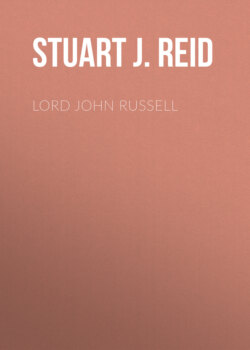Читать книгу Lord John Russell - Stuart J. Reid - Страница 12
На сайте Литреса книга снята с продажи.
CHAPTER IV
ОглавлениеTable of Contents
A FIGHT FOR LIBERTY
1830–1832
Lord Grey and the cause of Reform—Lord Durham’s share in the Reform Bill—The voice of the people—Lord John introduces the Bill and explains its provisions—The surprise of the Tories—‘Reform, Aye or No’—Lord John in the Cabinet—The Bill thrown out—The indignation of the country—Proposed creation of Peers—Wellington and Sidmouth in despair—The Bill carried—Lord John’s tribute to Althorp.
Earl Grey was a man of sixty-six when he was called to power, and during the whole of his public career he had been identified with the cause of Reform. He, more than any other man, was the founder, in 1792—the year in which Lord John Russell was born—of ‘The Friends of the People,’ a political association which united the forces of the patriotic societies which just then were struggling into existence in various parts of the land. He was the foe of Pitt and the friend of Fox, and his official career began during the short-lived but glorious Administration of All the Talents. During the dreary quarter of a century which succeeded, when the destinies of England were committed to men of despotic calibre and narrow capacity like Sidmouth, Liverpool, Eldon, and Castlereagh, he remained, through good and evil report, in deed as well as in name, a Friend of the People. As far back as 1793, he declared: ‘I am more convinced than ever that a reform in Parliament might now be peaceably effected. I am afraid that we are not wise enough to profit by experience, and what has occasioned the ruin of other Governments will overthrow this—a perseverance in abuse until the people, maddened by excessive injury and roused to a feeling of their own strength, will not stop within the limits of moderate reformation.’ The conduct of Ministers during the dark period which followed the fall of the Ministry of All the Talents in 1807, was, in Grey’s deliberate opinion, calculated to excite insurrection, since it was a policy of relentless coercion and repression.
He made no secret of his conviction that the Government, by issuing proclamations in which whole classes of the community were denounced as seditious, as well as by fulminating against insurrections that only existed in their own guilty imaginations, filled the minds of the people with false alarms, and taught every man to distrust if not to hate his neighbour. There was no more chance of Reform under the existing régime than of ‘a thaw in Zembla,’ to borrow a famous simile. Cobbett was right in his assertion that the measures and manners of George IV.’s reign did more to shake the long-settled ideas of the people in favour of monarchical government than anything which had happened since the days of Cromwell. The day of the King’s funeral—it was early in July and beautifully fine—was marked, of course, by official signs of mourning, but the rank and file of the people rejoiced, and, according to a contemporary record, the merry-making and junketing in the villages round London recalled the scenes of an ordinary Whit Monday.
On the whole, the nation accepted the accession of the Sailor King with equanimity, though scarcely with enthusiasm, and for the moment it was not thought that the new reign would bring an immediate change of Ministry. The dull, uncompromising nonsense, however, which Wellington put into the King’s lips in the Speech from the Throne at the beginning of November, threatening with punishment the seditious and disaffected, followed as it quickly was by the Duke’s own statement in answer to Lord Grey, that no measure of Parliamentary reform should be proposed by the Government as long as he was responsible for its policy, awoke the storm which drove the Tories from power and compelled the King to send for Grey. The distress in the country was universal—riots prevailed, rick-burning was common. Lord Grey’s prediction of 1793 seemed about to be fulfilled, for the people, ‘maddened by excessive injury and roused to a feeling of their own strength,’ seemed about to break the traces and to take the bit between their teeth. The deep and widespread confidence alike in the character and capacity of Lord Grey did more than anything else at that moment to calm the public mind and to turn wild clamour into quiet and resistless enthusiasm.
